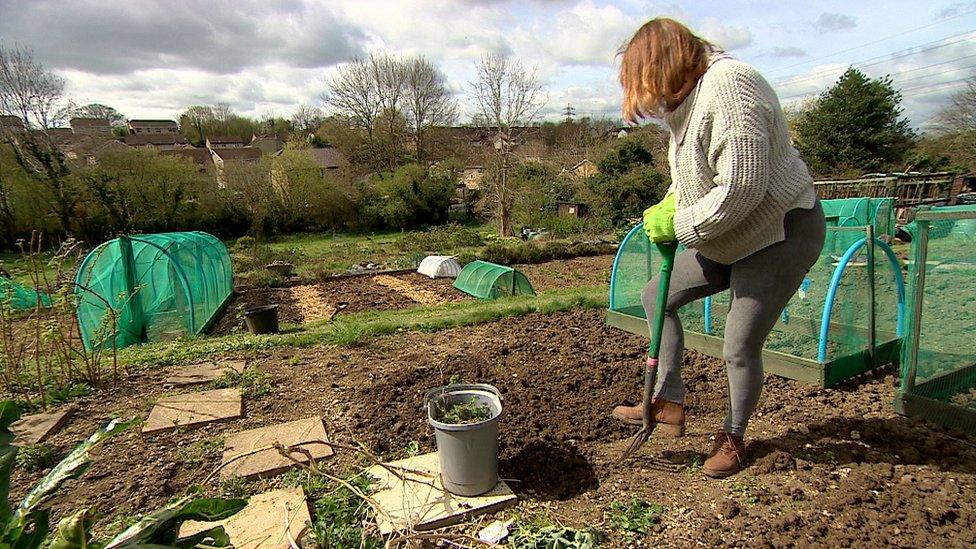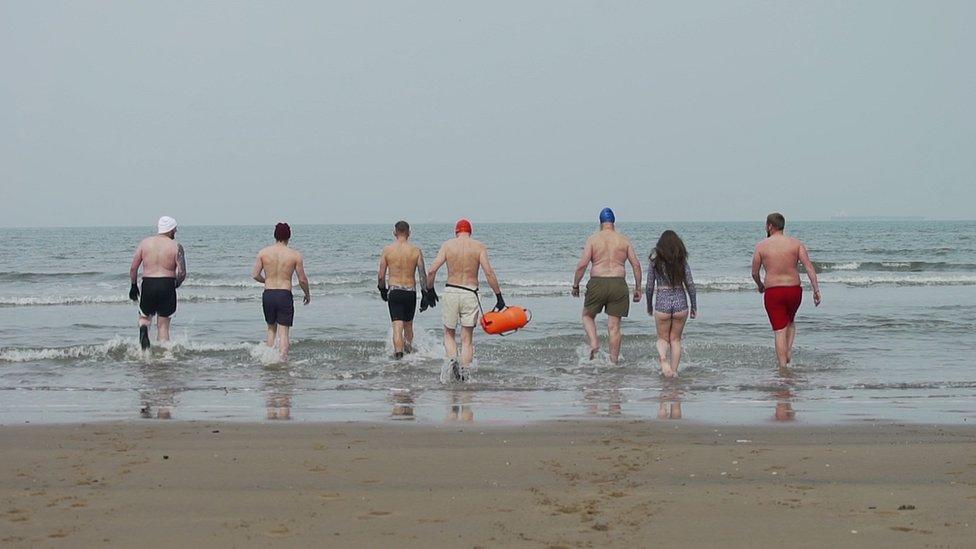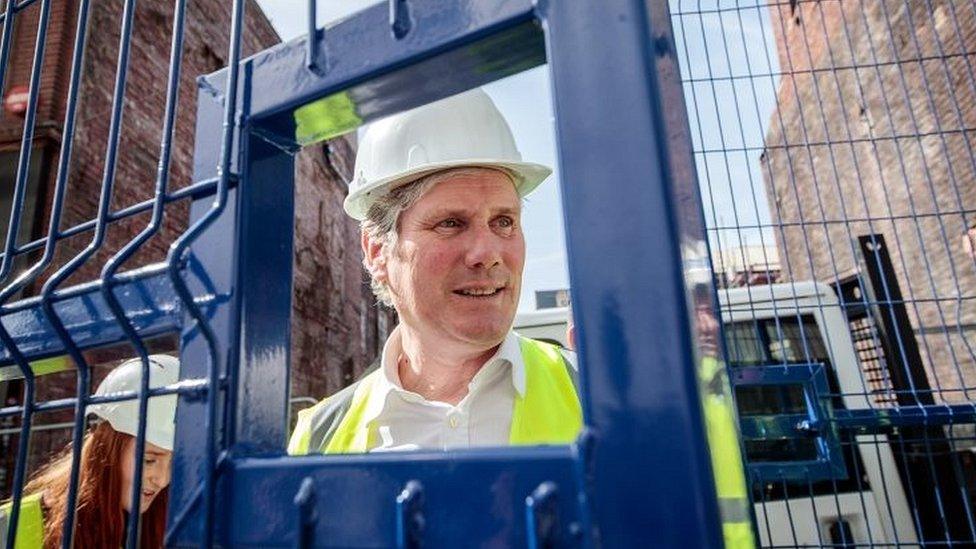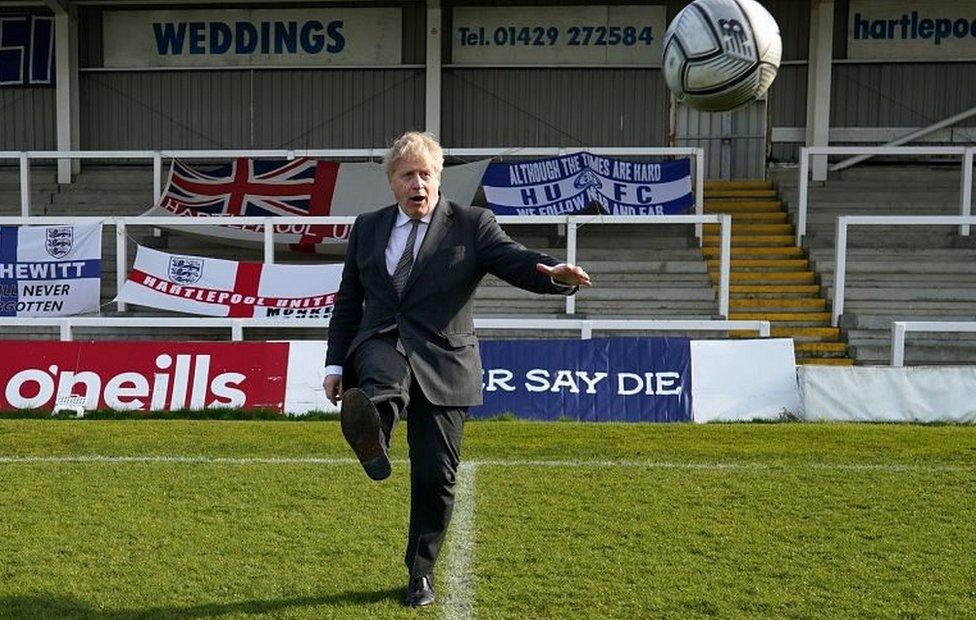Are voters warming to the local elections?
- Published

Digging the campaign? Swindon's allotment holders are ready to vote, but not overly excited
It's a big week for voters in many parts of England - but what issues are dominating their thoughts ahead of Thursday's local elections?
As the sunshine tried to break through the cloud at the Ventnor Road allotments, there was more talk of the impact of this year's late frosts than this week's bumper crop of elections.
Politically aware and community-minded, the allotment holders of Swindon were all planning to vote, but it's unlikely they'll be elbowing each other out of the way in their excitement to get to the ballot box.
It's perhaps unsurprising that parts of England don't seem gripped by election fever. This year's campaign has been more muted than most.
While leaflets have started dropping through letterboxes in recent weeks, in the early stages Covid rules meant door-to-door canvassing was limited.
It has started to pick up. Party placards have appeared in windows and can be spotted on the odd stake propped up in a forecourt.
Since being allowed out on the doorsteps, party activists in Swindon insist they have had a good response.
But even in an ordinary year local ballots don't attract the same level of attention as a general election - and this year Covid has added to the challenge.
That doesn't mean there's not a huge amount at stake.
In most places in England these are local elections - crucial in determining who runs services from libraries and leisure centres to social care - but they have national significance too.

Temperature test: The Hartlepool result is being keenly watched by the big parties
It's the first major electoral test since the pandemic - the first for Boris Johnson since his success at the 2019 general election, and the first for Sir Keir Starmer since becoming Labour leader and promising to revive the party's fortunes.
It's a measure of the direction in which Sir Ed Davey is taking the Lib Dems, whether the Green Party can build on recent support and what the future holds for the successor to the Brexit Party, Reform UK.
When the sun rises over Hartlepool in the early hours of Friday morning, it will bring with it one of the early verdicts.
With counting of the ballot boxes across England spread over a few days due to Covid rules, the by-election to choose the town's new MP will be one of the first clear results.
And if in most places campaigning has been limited, in Hartlepool it's been anything but.
Party bigwigs, pollsters and journalists have headed to England's north-east coast to take the temperature of a town whose decision will be key in determining the narrative of these election results.

The elections are Sir Keir Starmer's first big test since becoming Labour leader
It's being seen as a crucial test of whether the Conservatives can continue their march into traditional Labour seats now Brexit is no longer top of the agenda, or whether Labour can stem the tide and start to rebuild.
All the attention hasn't escaped a group of local swimmers who've been braving the freezing waters of the north sea every day during lockdown for the sake of their wellbeing.
For them, though, the significance of this election isn't the impact it might make in Westminster, but the difference it might make in Hartlepool; whether any of the parties will come good on promises to deliver jobs, investment and opportunity.
The pandemic has brought home to them a sense of place. The confinement of lockdown has heightened awareness of what's on the doorstep.
Among voters in the West Midlands, there is talk of the need to revitalise high streets; in Lincolnshire the desire for parks and recreational facilities for families, and in Derbyshire problems with traffic, planning and development - issues that are pertinent to local elections that may well influence people's choices.
But there are few who will entirely discount the national picture.
In Whaley Bridge, Derbyshire, famed for the dam that almost collapsed in 2019, some voters say they would put local issues to the fore, but for others the parties' national policy platforms and, crucially, the level of trust in them are what counts.

Can Boris Johnson replicate the Conservatives' success at the 2019 general election?
This week's results will be seen as a measure of whether Labour's claims of "Tory sleaze" have had an impact on voters, or whether the Conservatives are right to argue it's not what people care about.
They will be seen as a public verdict on the way the parties have responded to the pandemic.
They will be seen as further evidence of whether old party loyalties still hold, or whether the lines have been permanently blurred.
But they will also be a judgement on how mayors, councils and police and crime commissioners have performed and who people want to run the services they rely on.
These are local elections with national significance, and while the campaign might have been quieter in these Covid times, it doesn't mean the results won't reverberate.